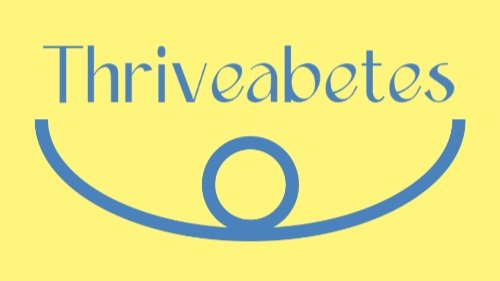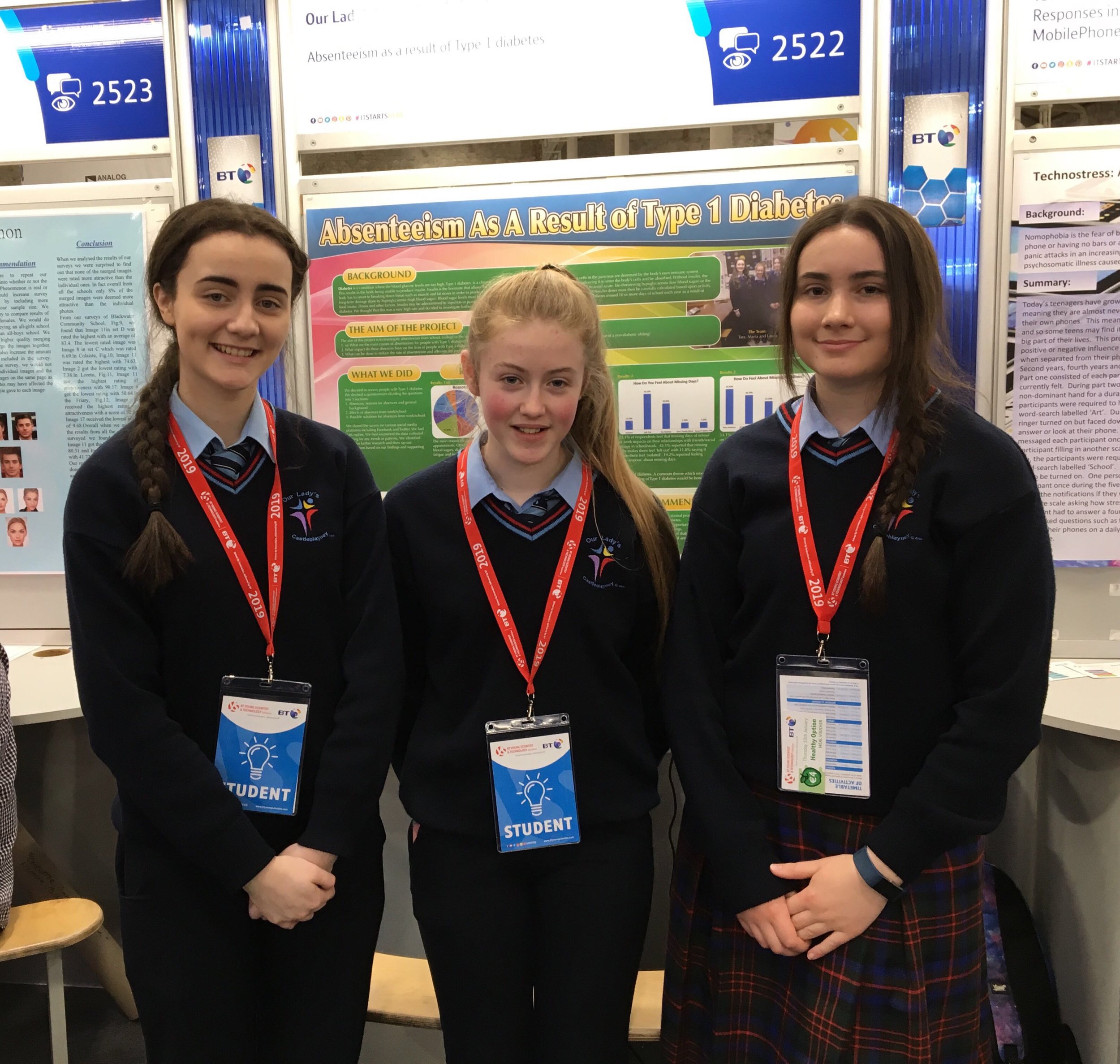Earlier in January, you may have seen a post or two on Facebook & Twitter about the Teens with Diabetes project on “Absenteeism as a Result of Type 1 Diabetes” for this year’s BT Young Scientist and Technologist of the Year Competition.
Well, I’m thrilled to report that Maria Duffy, Laura Christie and Tara Quinn made it through to the national competition and with some surprising finding too! Including:
69% of people with type 1 diabetes miss work or school because of their regular diabetes appointments
37% of people with type 1 diabetes miss work/school because they are ill - blood sugars too high/low
AND
14.6% of people with type 1 diabetes miss work/school because they are feeling down
Photo Teens with Diabetes
I asked the girls if they would write a piece and share their findings with the community once the competition was over and where the inspiration for the project came. Here it is.
Absenteeism & Type 1 Diabetes
BT Young Scientist and Technologist of the Year Competition
By Maria, Tara & Laura
Our names are Maria Duffy, Tara Quinn and Laura Christie. Maria was diagnosed with type 1 diabetes at age 3 and Laura aged 7. We are now 4th year students in Our Lady’s Secondary School Castleblayney, Co. Monaghan. Tara does not have diabetes but has been close friends with the girls and has another chronic illness, asthma.
The very beginning of this project started in 2017 when Maria, Laura and another classmate, then in 2nd year, entered the BT Young Scientist competition with a project named “To Pump or Not To Pump”. This was a comparative study into the methods of control of diabetes in teenagers.
PEER SUPPORT & INSPIRATION
It was first inspired when Laura asked Maria who was already using a pump, for advice on whether she too should swap to using a pump and what the advantages and disadvantages were. The girls entered the competition and were very intrigued by responses and findings from the project. One such point that they found very interesting was the fact that 32.8% of teenagers who replied to the survey had missed 10 or more days from school. Laura and Maria had very few days of absence and so decided to investigate further. Thus this year’s project began.
Having taken a break for the Junior Certificate, we returned to work with Tara our new recruit. The aim of this project was to investigate if people with Type 1 diabetes have more absences from work/ school than others who are non- diabetics. We then wanted to investigate further into what the effects of those absences are and what can be done to reduce the number of missed days that people with type 1 diabetes have.
To collect the data we devised a survey using Google forms and used several social media platforms to distribute it to type 1 diabetics around the country, especially using our Twitter page “ Teens with Diabetes”. We wanted to identify what their feelings towards absence are, what they find difficult about managing their diabetes at work/school and ways to make their lives as diabetics easier. We were delighted to receive 346 responses to the survey.
ABSENTEEISM & TYPE 1 DIABETES: THE FINDINGS
We then found very interesting points which we wanted to highlight.
Some of the results included;
36% of diabetics have missed more than 9 days in the last 12 months compared with their siblings of which just 3% have missed missed any more than 9 days in the last 12 months.
35.1% have missed 1-2 days and 28% missed 3-4 days due to clinic appointments alone. 3.4% have missed 11-12 days due to clinic appointments.
Regarding other diabetic appointments the majority of people missed 1-2 days at 44.9% and 10.1% missed over 5 days.
32.8% of people travel over 30km to their hospital
62.9% of people do not try to change appointments which fall during work/school hours, 37.1% do.
The main reasons for this is because appointments are not available outside working hours or on set days and rescheduling can mean a 6 month delay.
Reasons for absence include:
69% regular diabetes appointments
25.9% additional appointments
37.3% ill - blood sugars too high/low
29.4% tiredness/fatigue
18.4% stomach ache
14.6% feeling down
15.9% other
Photo from Teens with Diabetes
In addition to missing time in school or work, people with type 1 diabetes said that they knock on effect of this was the they feel anxious to catch up on work missed but they also had to deal with bosses and teachers comments on their absences.
44% of people find it difficult to catch up on missed work
40.5% feel anxious when they miss a day and 19.2% feel very anxious.
35.4% feel very anxious about missing deadlines and 28.7% feel a little worried.
31.9% of people have had teachers/bosses comment on absences. This has made 43.4% of people very anxious/frustrated.
33.1% believe that absences do affect their grades, 66.9% do not.
33.1% believe that absence does impact their relationship with friends/ social groups and of that, 43,1% feel a bit left out and 11,8% feel isolated.
Of course none of this could have been possible without the help of our teacher Ms Kathryn Higgins. We are so grateful for the help she has gave us and the support we have got from our school, families and anyone who assisted in this project.
Maria, Laura & Tara with their teacher, Ms Kathryn Higgins
Thank you so much Maria, Tara and Laura for sharing your findings with us - there were certainly a few surprises there. You can follow the girls on Twitter at @TeenswithDiabetes as they finish their education and journey onto bigger things.
BT YOUNG SCIENTIST & TECHNOLOGIST OF THE YEAR
DIABETES PROJECTS
This year, there were less diabetes themed projects at BT Young Scientist competition than in 2018. However, I feel the quality of the projects is increase and becoming more specific. In addition to the Teens with Diabetes Absenteeism project there was:
Runner Up Individual 2019 prize went to:
Discovery of the Ideal Microenvironment for the Differentiation of hiPSCs into Islets of Langerhans
Dublin - St Andrew’s College: Yasmin Ryan
Junior Individual 1st Place
Diabetes: Don’t sugar coat it - Improving the general populations’ understanding of Type 2 Diabetes to support prevention"
Cork - Colaiste Treasa: Hannah Walsh
The following projects are not specific to diabetes but I do feel that they are of interest to the diabetes community.
Sugar tax ~ Did it make a difference?!"
Cork - Presentation Secondary School Mitchelstown
"A study using statistical methods on the public's’ awareness of Silent Coeliac Disease and the effects of the disease."
Cork - Kinsale Community College
"Artificial Sweeteners Vs Sugars; The health risks associated with each"
Kilkenny - Castlecomer Community School
The future looks bright from here.




